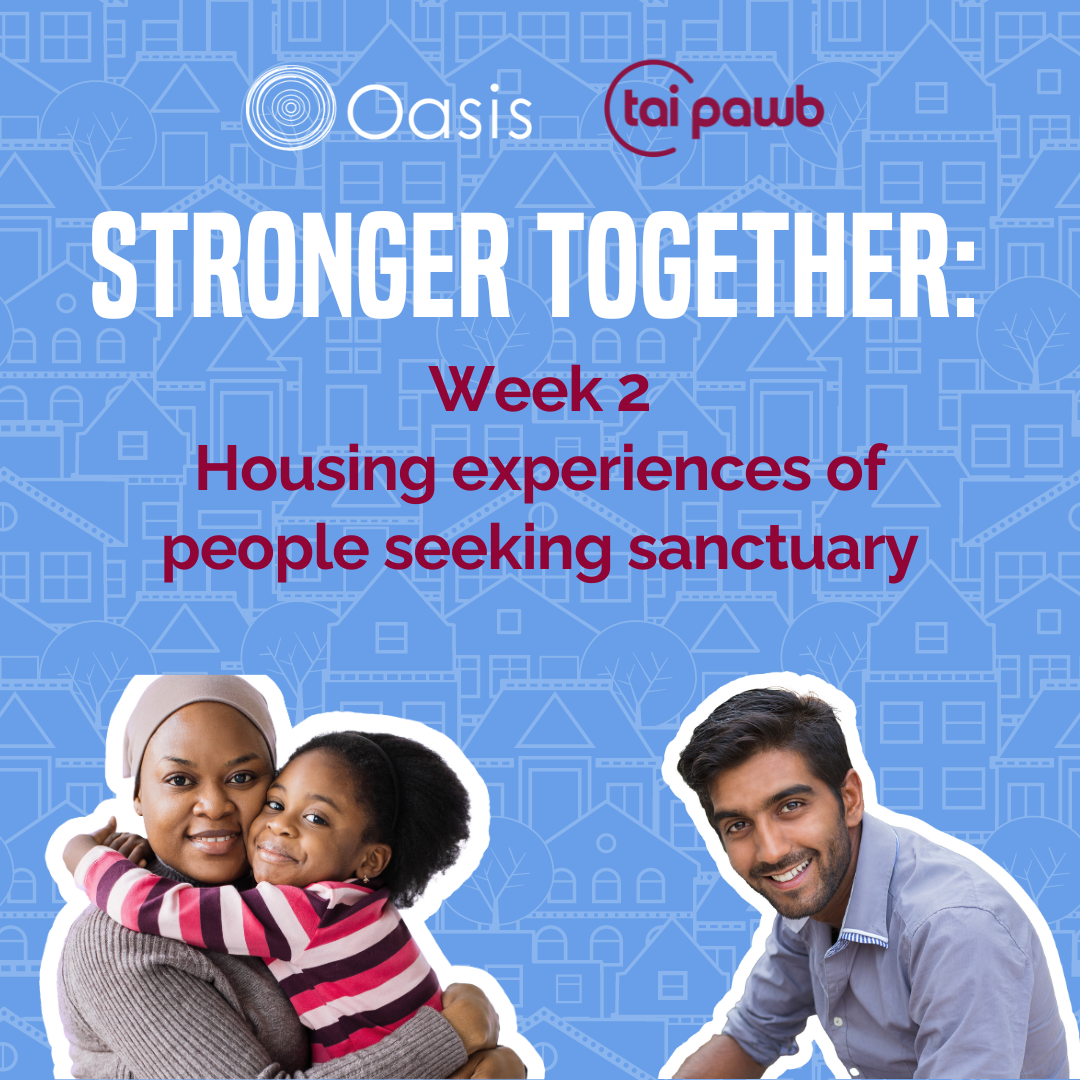#StrongerTogether: Week 2 – Housing Experiences of People Seeking Sanctuary

Welcome back to our campaign!
Over three weeks, Oasis Refugee Centre and Tai Pawb are shining a light on a pressing issue: homelessness and poor housing conditions among sanctuary seekers in Wales.
This week on the Tai Pawb, we share the housing experiences of people seeking sanctuary, and what they would change. We will also look at resources and organisations that offer support.
Week 2: Housing Experiences of People Seeking Sanctuary
Zainab

Zainab is a single mother of three living in challenging and dangerous dispersal accommodation. She shares her story.
“I was grateful to be moved into dispersal accommodation, but I have had so many issues. I can’t let my children play on the carpet because it is incredibly dirty and no matter how many times I clean it I cannot get the smell out. I want to provide comforting, home-cooked meals for my family, and cooking is a large part of my identity and how I show love. But this wasn’t possible. I haven’t had a kitchen I can use to prepare meals. There were broken cupboards and a rat infestation. Things got worse when there was a leak in the roof going into my daughter’s bedroom. I reported it, but months later the problem was just getting worse and it made her room uninhabitable. By December, we all narrowly escaped harm when the ceiling in her room collapsed. It was terrifying and we are so lucky that my daughter had been moved out of that room. I tried to get it sorted with Migrant Help and the house manager, but the system takes time and isn’t straightforward. Despite it being an emergency repair, it took months to be fixed.
Zainab’s situation shows that:
- Asylum seekers struggle to find safe, clean and dignified living conditions.
- The system does not meet their needs, and the system needs reforms to ensure that asylum seekers, particularly for mothers and children.
- There is a lot of bureaucracy in reporting maintenance issues and this causes dangerous delays. And they are not allowed to do their own repairs as an asylum seeker in Home Office Accommodation.
- Asylum seekers are not always aware of their rights and may be reluctant to raise an issue. Particularly if they have had negative experiences in the past.
Freddie

Freddie shares his story of multiple occupancy housing and the difficulties of integration as an asylum seeker. Freddy was housed in initial housing in a shared flat. He encountered unhygienic and unclean conditions.
“As someone who cares about my environment and my home, I took the initiative to clean the entire house. This included over 10 bags of rubbish from the yard alone. I was not provided with any cleaning products and it was hard to communicate with my housemates as we all speak different languages. I felt I lost some of my dignity in what was meant to be my home. I wish that the home office could provide spaces for us to grow vegetables and ways for us to integrate and to settle. I find gardens really beneficial for my mental health, especially after the traumatic situation I escaped from. If people were educated on how to look after outside spaces, and given the tools, we could grow vegetables and plant flowers.”
People who have sought asylum come from a range of countries and have experienced war, abandonment, genocide, hate crime and many other hardships and trauma. When they are initially housed in Wales, they are often in shared accommodation with people from other cultures, who speak other languages, in houses that are not culturally suitable, and people don’t always live cohesively.
Freddie’s story highlights some of the issues that asylum seekers face:
- They are often confronted with substandard living conditions and limited avenues for recourse
- They are not provided with cleaning products and tools and have to survive on a meagre weekly allowance that only covers basics
- There is no choice of accommodation, and it often involves house sharing, overcrowding and culturally unsuitable housing
- Trauma can impact the way people use their space and look after their homes and themselves, and there is no support offered
Resources and support:
- Cardiff University have published their summary on the housing experiences of people seeking sanctuary in Cardiff Findings include poor quality accommodation, poor mental wellbeing and a lack of support Read it here: https://bit.ly/3yI59Hf
- Housing Justice Cymru’s Hosting Project connects volunteer households with people seeking sanctuary in Cardiff, Newport, and Wrexham. Providing temporary, safe accommodation and support to help with integration and belonging. For more details, visit: https://housingjustice.org.uk/cymru/host-a-refugee-in-cardiff
- EYST Swansea offers culturally sensitive support to young asylum seekers and refugees. EYST have recently taken over the Share Tawe hosting project for asylum seekers with NRPF, partnering with Pobl Housing Association. Find out more: https://www.eyst.org.uk
- NACCOM have a toolkit which showcases the role that Housing Associations can play in supporting the accommodation of people seeking sanctuary who are homeless or at risk of homelessness Find it here: https://bit.ly/3wYmJ9
Tune in next week, when we look at refugee accommodation in Cardiff.